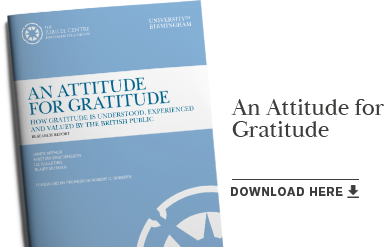Project Overview
The Attitude for Gratitude report was launched by Dr Michael Mosley, British Television Journalist, Presenter and Producer, on Wednesday 4th February 2015, at the British Academy. The report sets about trying to establish the way in which the British public understands, experiences and values gratitude. The project involved a large scale examination of gratitude in the UK with over 10,000 people taking part in the research across a range of demographic variables. The study employed a number of specifically-designed survey-based research methods to explore gratitude in the UK including a new Multi-Component Gratitude Measure which allowed the Centre to test gratitude-related conceptions, behaviours, emotions and attitudes alongside one another – a world first.

Summary of Key Findings
Furthering gratitude in Britain:
- It is widely accepted that there is a lack of gratitude in Britain. 80% believe there is a lack of gratitude in society.
- 78% of our sample (N = 554) would like to see more effort spent on promoting gratitude, particularly in educational and workplace contexts. Currently almost 50% believe there is a lack of gratitude in their workplace and over 60% believe that it is lacking in schools.
Findings about gratitude in Britain:
- In two independent studies of British university students and US-based college students, it was found that the British tend to associate gratitude with negative features more often than the Americans do. When asked which features they associated with gratitude, 29% of UK students cited obligation or indebtedness in comparison to 9% in the US. In addition, 17% of UK students cited guilt in comparison to 0% of students in the US.
- When comparing gratitude to other important values such as honesty, fairness, kindness, courage, humility and self-control, the British typically place gratitude around the middle in terms of importance.
- The importance afforded to gratitude appears to alter slightly with age with adults deeming gratitude more important than adolescents or children.
- Younger children are more likely to be grateful for benefits that are self-oriented, whereas older children pick out benefits that have an impact beyond the self.
- Women report higher levels of gratitude than men. When asked to rank gratitude in terms of its importance, 76% of women ranked it as ‘high priority’ in comparison to 66% of men.
- Christians score higher than Atheists in grateful feeling. When asked to rank gratitude in terms of its importance, 75% of Christians ranked it as ‘high priority’ in comparison to 65% of Atheists. Interestingly though, there is no difference between these two groups in terms of gratitude-related behaviours.
